- Home
- Jerry B. Jenkins
Shadowed Page 6
Shadowed Read online
Page 6
“Okay, so I talk to her machine. So what?”
“You think I just fell off a turnip truck, Roscoe?”
“What? No!”
“You underestimate me. You don’t think I’m highly enough placed within the NPO to have access to your information?”
“What are you saying?”
“First, your call-in time is four hundred hours, not two hundred hours.”
“Point taken. That was a slip of the tongue on my part.”
“Oh, fine then. As long as it was just a mistake. That little two-hour error could have cost everyone here, couldn’t it? Your code word is boomerang, your password is Cuba, and your red-flag catchphrase is same old same old.”
“Can’t blame a guy for trying.”
Paul rubbed his eyes. “I don’t have the time or energy for this, Jack. Do you?”
“Don’t believe I do, Paul. But if we kill him and he doesn’t report in at four o’clock, then what happens? If we’re already made, we’ve got to move.”
11
SOMETHING UNIQUE was happening with the kids, Jae decided. Angela had bid them good night, and Jae was convinced they would immediately begin badgering to know all that was going on. Jae had promised. She owed them that much. And she could remember herself at their ages, feeling always on the perimeter, never really knowing what was happening among the adults.
Maybe it was fatigue, maybe excitement, the new surroundings, the movie; she didn’t know what. But they came back from the bathroom in their pajamas and carrying their toothbrushes, looking so weary they could have dropped right there.
Jae put them down in single beds pulled together, and neither seemed to feel like talking. “Tired?” she said. Brie nodded and turned onto her side. Connor stretched and yawned. “Guess what I’m going to do before I go to sleep?” Jae said.
“Eat,” Connor said.
“No. Are you hungry?”
He shook his head. “Only for bread and fish. It sure looked good in the movie.”
“I’m going to pray,” Jae said.
The kids stared at her. “Like Jesus prayed?” Brie said. “He blessed the food before He made it stretch to feed all those people. Miss Angela said He was talking to His Father.”
Jae nodded. “That’s who I’m going to pray to. Jesus’ Father. He’s God.”
Connor rolled up onto an elbow. “Where does God live?”
“In heaven.”
“Where’s that?”
“We don’t know. Somewhere far, far away.”
The kids fell silent. “Is it a fairy tale?” Brie asked finally. “A make-believe story?”
Jae shook her head. “It’s real. God lives in heaven, and Jesus is His Son. God sent Him to the world to love us.”
“Jesus loves us?” Connor said. “He doesn’t even know us.”
“Yes, He does, because He’s God’s Son.”
“He’s still alive?” Brie said. “That story looked like it was from a long time ago.”
“More than two thousand years ago,” Jae said. “But you know what? Jesus is still alive. He will be alive forever. And we can be too.”
“We can?” Brie managed, her eyes slow and heavy.
Jae knew if she just quit talking, the kids would fall off to sleep. And so she did. And so they did.
* * *
Paul found Jae dozing when he returned, and he tried not to wake her as he took off his shirt, shoes, pants, and socks and lay back on the bed.
“How was your prisoner?” she mumbled.
He turned to see her eyes still shut. “Sleep,” he said.
“I want to know,” she said.
He told her who it was and that he would have to leave her again at near four in the morning for the phone-in to the NPO.
“I’m sorry,” she said.
“Me too. I’m dead.”
She told him she had prayed with her mother before her father had arrived home.
“She was a believer then?” he said.
“I think she was, Paul. And I believe the kids soon will be too, though I worry about them.”
“How so?”
She told him how they had forgotten all their questions, didn’t bug her about promising to tell everything.
“That is strange.”
“They’re going through a lot, Paul. Too much. I feel guilty. As if it’s my fault. As if I should have somehow been able to shield them from all of this.”
“We both know it’s my fault,” Paul said. “Of course, I wouldn’t have it any other way and can think of no alternatives, but it was my choice that put our whole family in jeopardy.”
She didn’t respond. He was grateful. She needed sleep as badly as he did.
At ten minutes of four, the alarm feature embedded in Paul’s teeth sent a tone only he could hear through his cranium. He immediately sat up, as clouded and heavy lidded as he had felt in a long time. Slipping out of bed, he dressed quickly. Jae and the kids lay stock-still, breathing deeply.
Paul grabbed a small set of wires with a suction cup and earpiece from one of his cases and found Jack Pass at the end of the hall in the golf cart. “How is it you look so chipper?” Paul said.
“I’m a night owl. Can hardly tell day from night here anyway. Besides, I’ve got an idea.”
“Uh-oh.”
“Yeah, I know. It’d be like you trying to give me educational ideas. I’m not in espionage, and I—”
“Just spill it, Jack. I’m not territorial, and I’m wide-open to any suggestion. I’m going to go crazy cooped up down here for long, but unless one of us comes up with a plan, I’m stuck. I have to be the most recognizable and vulnerable fugitive in the USSA.”
Jack zipped past the security checkpoint and finally pulled up outside the holding room for Roscoe Wipers. “Where’d he get a name like that anyway?” Jack said. “Sounds like a retail shop.”
Paul stared at him. Surely Jack wasn’t expecting an answer. Where does a man get a name like Jack Pass either?
“Anyway, here’s what I’m thinking. This gun—” and he pulled out one of the heaviest, ugliest, oldest .357 Magnums Paul had ever seen—“uses high-speed hollow-point tips and will wake the dead.”
“Tell me about it. You’re not planning to kill this guy, are you?”
“Not for real. But I should ask you the same, Paul. I could see in your eyes you’d have liked to have dropped him yourself earlier.”
“Let’s just say you’d better handle the gun,” Paul said. “But for what, if you don’t plan to actually use it on him? Pretend?”
“Exactly. We get him connected, make sure he says the right stuff, have him tell this woman’s machine that we have moved out of Washington. Then, just as he’s starting to tell her where we’ve gone, we interrupt him, tell him he’s been made, fire off the gun, he drops the phone, end of threat.”
Paul thought a moment. “I like it,” he said. “I think. The question is whether we let Roscoe in on the fact that he’s not really going to be killed.”
“I say let him wonder. Then he won’t pull anything.”
“You’re going to shoot the weapon regardless, and maybe more than once?”
“Right,” Jack said.
“Better tell your people, unless you want them to come running, guns out.”
“Right again. And here’s Roscoe’s phone.”
A minute later Paul and Jack stood before the door of the darkened room. “We’ve got to put him on the defensive right off the bat,” Paul said. “Unlock the door and open it just a quarter inch.”
Jack knelt by the doorknob. When the door was unlocked he signaled Paul, and Paul waved him out of the way. “Follow me in with the gun,” he said. Paul backed up a step and drove his foot into the door. It flew open, crashing the wall as he turned on the lights. Roscoe Wipers, stretched awkwardly on the table with a woolen army blanket and a pillow and wearing only an undershirt and shorts, raged and swore and thrust out both arms, shrieking as the handcuff at his wrist reache
d its limit.
“What’d ya have to do that for?” Roscoe whined.
“Time for your phone call,” Paul said, “if I can talk my friend here out of just plugging you right now.”
Roscoe’s eyes widened at the sight of the gun. “I said I’d cooperate, didn’t I?”
“You also lied to us first, gave us phony code words, all that. Why should we trust you?”
“Well, for starters,” Roscoe said, pointing at the .357, “that.”
Paul attached his listening device to Roscoe’s phone with the tiny suction cup and secured the earpiece in his own ear. “One mistake, intentional or not, and all I have to do is nod at Wyatt Earp here.”
Roscoe sighed. “Listen to me, Stepola. I don’t want to die, all right? You’ll see. I’ll do this good, the way you want it.”
Jack sat facing him four feet away, the pistol in his hands. The wires on Paul’s bugging device were but three feet long, so he sat closer. He told Roscoe exactly what he wanted him to say. “I hear anything close to ‘same old same old’ before you’re supposed to say it, and you’re a dead man.”
Roscoe punched in the numbers. He looked as surprised as Paul felt when Bia answered.
“Balaam,” she said.
“Code word boomerang, password Cuba,” Roscoe said.
“I recognize your voice, Wipers,” Bia said. “Everything okay?”
“Oh, you know, same song, different verse.”
With the sound of the s in same, Jack rose, loudly cocking the gun and pressing it against Roscoe’s temple, so hard that the man cringed and tried to pull away.
“If you don’t mind my asking, ma’am, what are you doing awake?”
“Can’t sleep. I lost my son, you know.”
“Sorry.”
“Yeah, thanks. I know I’m not alone, but . . . you lose anyone?”
“Yes, ma’am. A few relatives. I have no kids.”
“But that young man we planted with you. What about him?”
“He died, ma’am. Six straight up.”
A long pause. “Well, but, then . . . you, you’ve been made, haven’t you?”
Paul narrowed his eyes at Roscoe as if to remind him his very life depended on his answer.
“I must be pretty good, ma’am, because I convinced ’em it was a coincidence. At least so far. They’re performing an autopsy.”
“That’s not good, Agent Wipers. The common denominator of these deaths is that they make no pathological sense. Cause of death is being reported as the irreversible cessation of vital functions. No heart attack, no stroke, no aneurysm. They simply die. What’re you going to do when they come back to you with that news?”
“I don’t know. Hope you guys extract me, I guess.”
“What did you mean by ‘different verse,’ Agent?”
“Ma’am?”
“You said, ‘Same song . . .’”
“Oh yeah. Lots of talk around here about a mass exodus. Everybody’s packing. We’re leaving within the hour.”
“Where to?”
“They’re too smart for that, ma’am. They don’t even tell the long-timers here where they’re going. I hear rumors of the new place being a couple of hours north, though, but that’s all I know.”
“You ever figure out where you are? I’m not saying we’ve got forces that can get there before the move, but obviously we’d have to have some idea.”
“I told you, they bring even the ones they know and trust a long, convoluted way, with blindfolds and hoods on.”
“Well, your info has been good and the names invaluable. As soon as you know where the relocation site is, get back to me.”
“Will do . . . oh no.”
“What?”
“Same old same old!”
“What’s the problem, Agent?”
“I’ve been made!”
“How do you know? Ditch the phone!”
Paul removed the suction cup and smacked the phone out of Roscoe’s hand, and it clattered to the table and then to the floor. Paul prayed it was still connected to Bia Balaam.
“Marmet!” Jack hollered.
“What?”
“Who are you working for?”
“Nobody! What?”
The gun exploded twice, and Paul reached down to slap the phone shut.
12
JAE’S EYES POPPED OPEN at about nine in the morning Wednesday, January 23, but she felt no compulsion to rise. She had not even heard Paul return, and the kids were still dead to the world. She felt hungry, but she was convinced her body needed rest more than food.
Through the tiny slits in the shades at the windows to the hallway, she saw shadows passing from both directions. The Washington, D.C., underground was alive with activity, but everyone had assured her no one would bother the Stepolas until they emerged from their cozy warren.
So this was what it meant to be a believer. Grief over her brother. Mourning her mother. Horrified at the unspeakable magnitude of the loss around the world. And yet a deep sense of peace. She wasn’t happy. Jae couldn’t call it that, not with everything that had happened. But there was a bedrock contentment that God was somehow in control.
She didn’t need to understand Him. It wasn’t her place to judge His actions. Had the curse, the plague, seemed excessive? Yes, to her human mind. But ever since she had made the transaction and placed her eternal destiny in the hands of the God she had only recently come to believe in, her own intellect felt puny. From the Bible discs she had listened to, she resonated with verses that said such things as the fact that man’s wisdom was not God’s wisdom and that His ways were beyond finding out.
Jae didn’t know how long her fragile, fugitive family would last on earth, but part of her couldn’t wait to meet God and Jesus face-to-face in heaven and have myriad mysteries explained. Her goal the next time she strapped on the earphones and drenched her soul with the soothing truths of the New Testament was to find the verse that said God provided a peace that passes all understanding. Truer words had never been spoken.
Two hours later Jae had risen, taken the kids to breakfast, and was on her way to her first day as Angela’s assistant. On her way out, she had found a note slipped under the door from Jack Pass to Paul: Call me when you’re ready for breakfast. Roscoe’s desperate to talk.
* * *
Paul had long been grateful that he had the ability to recover from extended exhaustion with one good night’s sleep, as long as he got in enough hours. As he showered and dressed, he felt invigorated. The underground was already beginning to feel confining and even claustrophobic, but he sure felt better about having Jae and the kids hidden away.
He was encouraged to see dozens of adults jogging the endless corridors as he made his way toward Jack Pass’s office. So that was how people stayed in shape and kept their sanity down here.
“Hope you don’t mind scrambled and links nuked,” Jack said, pulling a Styrofoam plate from a small refrigerator, removing the foil top, and sliding it into the microwave as Paul sat.
“Well, I was hoping for the all-American buffet.”
Ninety seconds later they were eating and talking across Jack’s cluttered desk. “So what’s up with Roscoe?” Paul said.
“You’ll see. He’s kind of weepy this morning. Didn’t sleep well.”
“I can’t say the same,” Paul said. “Slept like a gravestone.”
“Nice image,” Pass said. “But I know what you mean. Slept pretty well myself. You gotta know you scared me good when you recognized Marmet as NPO. I figured we’d all be toast soon.”
“You could have been. But I believe in God’s timing, don’t you?”
“I oughta by now,” Jack said.
When they were finished, Jack asked if Paul wanted to visit Roscoe.
“Nah, let ’im stew. He’s not going anywhere.”
“He’s pretty agitated.”
“That make you feel guilty?” Paul said. “Think you owe him putting his mind at ease? He was willing to sacr
ifice every soul in here just a few hours ago.”
Jack shrugged. “Hard to argue with logic. He’ll wait. You want to be brought up to speed on job number one around here?”
* * *
Jae had never met anyone like Angela. The woman had her own sorrows, being a single mom with two young boys, living underground, uncertain of her own future. But it was clear Angela had learned to take the focus off herself. It was as if she lived to serve others.
And where had she learned so much about the Bible? Jae had been enriched, filled, nearly overwhelmed by what she had heard on all the discs, but she had to admit she found more than half of it confusing. She hated to acknowledge, even to herself, that she feared she was at the level of these young children in her knowledge of the Bible.
That meant she was in the perfect place. Questions the kids asked were questions she had, and Angela explained things so clearly and simply that Jae was drinking it in. She felt as if she had learned more in a couple of hours than she had known in a lifetime.
What she loved most, of course, was that she could read her own children’s faces. They were enamored of all the stories, fascinated with Jesus, and had a ton of questions. She and they would all learn together, and she prayed it wouldn’t be long before Brie and Connor shared her faith.
* * *
“I think you’ll find this a pleasant surprise,” Jack Pass said, handing Paul a protective mask and coveralls.
“You’ve got my attention.”
They sped to the other end of the compound, Jack checking the security checkpoints near the various entries. Finally they arrived at a cavernous area with what appeared to be miles of exhaust hoses running from cars to the ceiling. “They’re all connected to hidden vents at the surface,” Jack said.
The room was full of men and women working on the cars. “I hate to say it,” Jack said, “but in many ways, this latest catastrophe is the best thing that has happened to this kind of work.”
“And what kind of work is this?”
“Appropriating cars, clothes, and identities.”
Paul narrowed his eyes.
As if reading his question, Jack said, “No, we don’t steal their money. We assume they have left families who need their resources. But if they’re dead, they certainly don’t need their clothes, their driver’s licenses, that kind of stuff. Yes, regrettably we’re leaving some bereaved families without vehicles, but that’s the price of war.”

 The Betrayal
The Betrayal The Valley of Dry Bones
The Valley of Dry Bones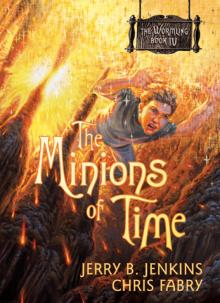 The Minions of Time
The Minions of Time Wild Rescue
Wild Rescue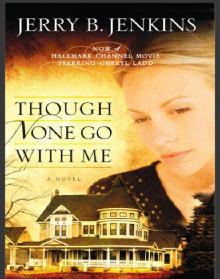 Though None Go with Me
Though None Go with Me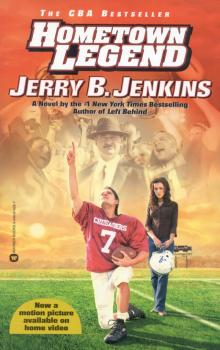 Hometown Legend
Hometown Legend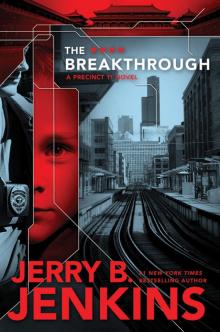 The Breakthrough
The Breakthrough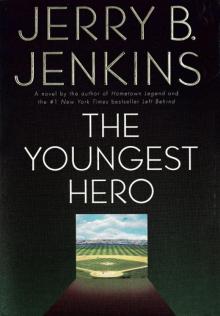 The Youngest Hero
The Youngest Hero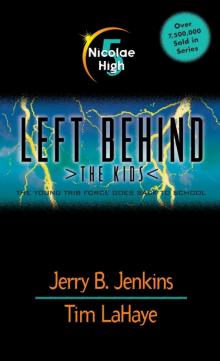 Nicolae High
Nicolae High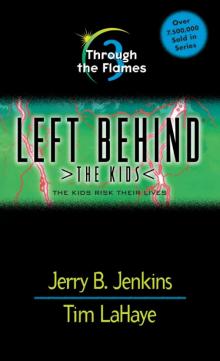 Through the Flames
Through the Flames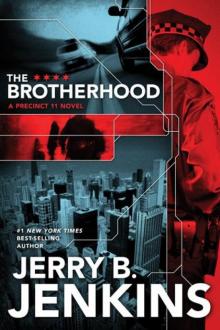 The Brotherhood
The Brotherhood Grave Shadows
Grave Shadows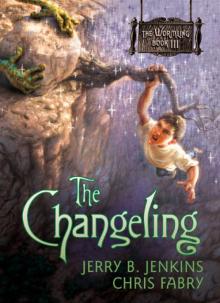 The Changeling
The Changeling Shadowed
Shadowed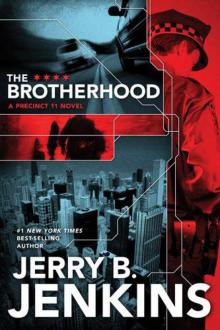 Precinct 11 - 01 - The Brotherhood
Precinct 11 - 01 - The Brotherhood Second Chance
Second Chance Silenced
Silenced The Vanishings
The Vanishings Dead Sea Rising
Dead Sea Rising Soon
Soon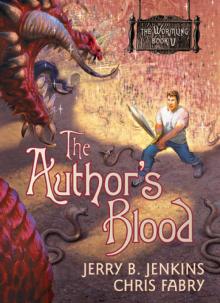 The Author's Blood
The Author's Blood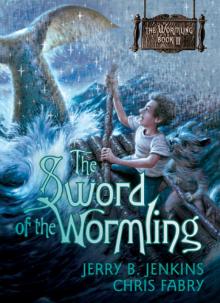 The Sword of the Wormling
The Sword of the Wormling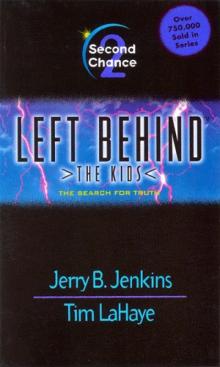 Left Behind - The Kids 02 - Second Chance
Left Behind - The Kids 02 - Second Chance Haunted Waters
Haunted Waters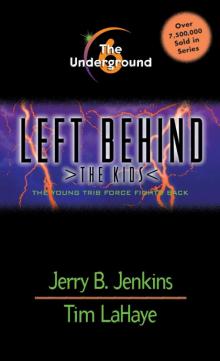 The Underground
The Underground Mark's Story
Mark's Story Shaken
Shaken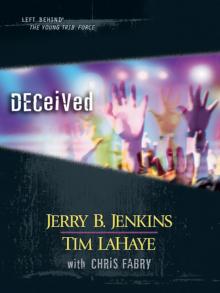 Deceived
Deceived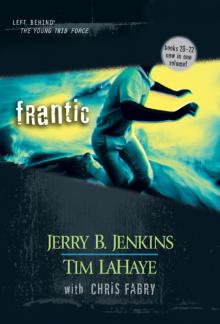 Frantic
Frantic Riven
Riven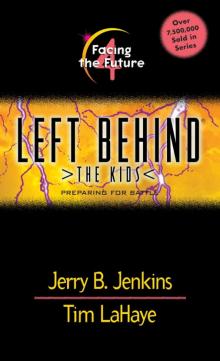 Facing the Future
Facing the Future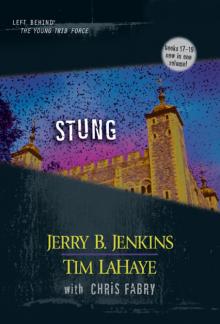 Stung
Stung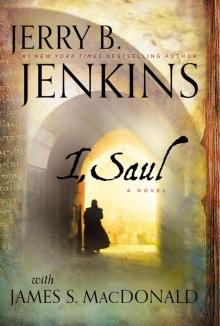 I, Saul
I, Saul Hunted
Hunted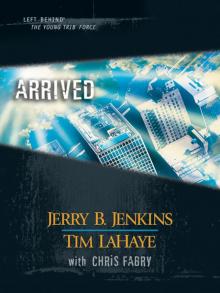 Arrived
Arrived John's Story
John's Story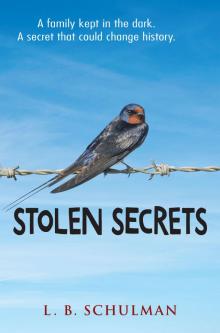 Stolen Secrets
Stolen Secrets